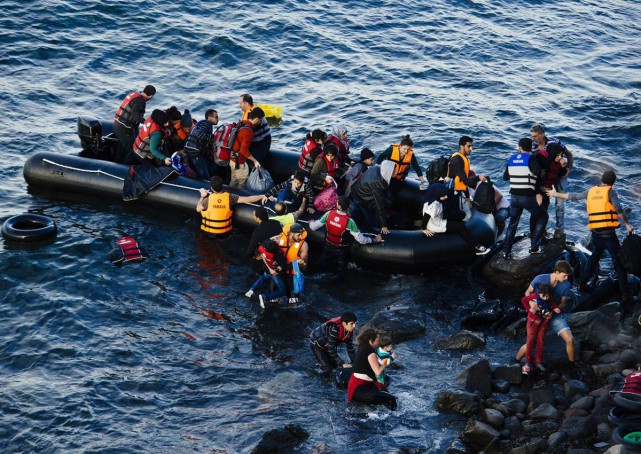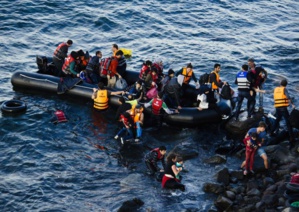Turkey receives “3 billion euros” from the European Union so as to facilitate the “travel visas”; while there are "re-energised" talks of “joining the bloc” whereby assisting the migrant flow in Europe.
The leaders of EU met at a summit that was held in Brussels wherein they decided to create an “action plan” which is to involve the President of Turkey, Tayyip Erdogan. The latter will be the cooperating channel for arranging better livelihood for the “two million Syrian refugees in Turkey”. Moreover, Turkey gave its consent on controlling border security so as to slow down the “influx of migrants crossing Turkey from Asia”. However, Donald Tusk the chairman of the summit said:
"Our intensified meetings with Turkish leaders ... in the last couple of weeks were devoted to one goal: stemming the migratory flows that go via Turkey to the EU. The action plan is a major step in this direction”.
The meeting drew conclusion that Turkey would be offered “an accelerated path” whereby it will provide “its citizens visa-free travel to the EU” in a condition that the country complies with the above mentioned agreements. The reality check on progression can only be made once the slowing down of migration starts getting effected. Merkel has been recorded to state that Europe will not succeed in filtering migrants without the collaboration from Turkey, whereby she said:
"The hotspots alone won't solve the problem”.
However, the President of France retained that Turks will not be entertained with “visas on easier terms” until and unless they put a halt on “granting such easy entry to Pakistanis, Afghans and others who end up heading to Europe”. In fact, the conditions carry on further stating that Turkey will also have to act on a previous agreement whereby, it will have to accept back the refugees who could not find shelters in the asylum. In Hollande’s words:
"There must be no misunderstandings”.
European governments still show hesitations in granting “full visa-free access” to the “78 million Turks”; therefore most likely this agreement will be first implemented on “business travellers and students”. There have also been considerations on re-energising “moribund”, whereby the leaders stated:
"The accession process needs to be re-energised with a view to achieving progress in the negotiations in accordance with the negotiating framework and the relevant Council conclusions”.
Sometimes back Turkey had urged the European Commission to loosen the restrictions on “some Turks travelling to the EU”. Moreover, Turkey also “sought 3 billion euros” as financial aid in new scheme which opened “six so-called chapters of the accession process” including various affairs like economic, justice, and monetary issues.
The agreement primarily focussed on managing the migration crisis, whereby helping the neighbouring countries “to reduce pressure to leave and on bolstering border controls” along with hastening the deportation process of the refugees who could not be accommodated in the asylum. There was also “serious talks” in regards to the reformation of the “EU asylum system”. Attempts are being made to turn pilot project into permanent solutions to give shelter to the refugees “around the EU by national quotas”.
According to Merkel’s words:
"In the end we are all Europeans, and this refugee question will challenge all of us."
While a senior leader of EU stated:
"In our neighbourhood, we are not asking any more for fundamental rights after the Arab Spring. We are asking for stability."
Although, there is a major doubt regarding a Muslim country becoming a member of the union, the EU is desperately looking out for help from Turkey. Therefore, one of the leaders said:
"We understand the added value of Turkey. But we cannot give it carte blanche."
References:
www.firstpost.com
The leaders of EU met at a summit that was held in Brussels wherein they decided to create an “action plan” which is to involve the President of Turkey, Tayyip Erdogan. The latter will be the cooperating channel for arranging better livelihood for the “two million Syrian refugees in Turkey”. Moreover, Turkey gave its consent on controlling border security so as to slow down the “influx of migrants crossing Turkey from Asia”. However, Donald Tusk the chairman of the summit said:
"Our intensified meetings with Turkish leaders ... in the last couple of weeks were devoted to one goal: stemming the migratory flows that go via Turkey to the EU. The action plan is a major step in this direction”.
The meeting drew conclusion that Turkey would be offered “an accelerated path” whereby it will provide “its citizens visa-free travel to the EU” in a condition that the country complies with the above mentioned agreements. The reality check on progression can only be made once the slowing down of migration starts getting effected. Merkel has been recorded to state that Europe will not succeed in filtering migrants without the collaboration from Turkey, whereby she said:
"The hotspots alone won't solve the problem”.
However, the President of France retained that Turks will not be entertained with “visas on easier terms” until and unless they put a halt on “granting such easy entry to Pakistanis, Afghans and others who end up heading to Europe”. In fact, the conditions carry on further stating that Turkey will also have to act on a previous agreement whereby, it will have to accept back the refugees who could not find shelters in the asylum. In Hollande’s words:
"There must be no misunderstandings”.
European governments still show hesitations in granting “full visa-free access” to the “78 million Turks”; therefore most likely this agreement will be first implemented on “business travellers and students”. There have also been considerations on re-energising “moribund”, whereby the leaders stated:
"The accession process needs to be re-energised with a view to achieving progress in the negotiations in accordance with the negotiating framework and the relevant Council conclusions”.
Sometimes back Turkey had urged the European Commission to loosen the restrictions on “some Turks travelling to the EU”. Moreover, Turkey also “sought 3 billion euros” as financial aid in new scheme which opened “six so-called chapters of the accession process” including various affairs like economic, justice, and monetary issues.
The agreement primarily focussed on managing the migration crisis, whereby helping the neighbouring countries “to reduce pressure to leave and on bolstering border controls” along with hastening the deportation process of the refugees who could not be accommodated in the asylum. There was also “serious talks” in regards to the reformation of the “EU asylum system”. Attempts are being made to turn pilot project into permanent solutions to give shelter to the refugees “around the EU by national quotas”.
According to Merkel’s words:
"In the end we are all Europeans, and this refugee question will challenge all of us."
While a senior leader of EU stated:
"In our neighbourhood, we are not asking any more for fundamental rights after the Arab Spring. We are asking for stability."
Although, there is a major doubt regarding a Muslim country becoming a member of the union, the EU is desperately looking out for help from Turkey. Therefore, one of the leaders said:
"We understand the added value of Turkey. But we cannot give it carte blanche."
References:
www.firstpost.com






